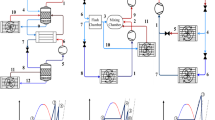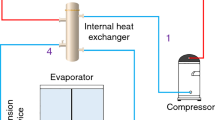Abstract
Low-charge multiplex refrigeration system (LCMRS) used in supermarket application is defined as low-energy performance in cooling system considered as important energy consumers. In this context, this study primarily examines energy and exergy performances of the LCMRS and expresses their changes in a supermarket application. Additionally, environmental performances of LCMRS were evaluated based on different refrigerants. In the study, the effects of R-404A, R-407C, and R-152a refrigerants on performance were also examined, and it was found that R-152a and R-407C gases have significant advantages in terms of performance and environmental impacts.
Access this chapter
Tax calculation will be finalised at checkout
Purchases are for personal use only
Similar content being viewed by others
References
Baxter VD (2003) IEA Anne4 26: advanced supermarket refrigeration/heat recovery systems final report volume 1 – E4ecutive summary. Oak Ridge National Laboratory, Oak Ridge
Horst K (2000) Refrigerant use in Europe. ASHRAE J. www.ashraejournal.org
Bagarella G, Lazzarin R, Noro M (2014) Annual energy analysis of a water-loop self-contained refrigeration plant and comparison with multiple4 systems in supermarkets. Int J Refrig 45:55–63
Schijnel PPAJV, Kasteren JMN, Janssen FJJG (1998) Exergy analysis–a tool for sustainable technology – in engineering education. Eindhoven University of Technology, The Netherlands
Dincer I, Rosen MA (2005) Thermodynamic aspects of renewable and sustainable development. Renew Sust Energ Rev 9:169–189
Stegou-Sagia A, Paignigiannis N (2005) Evaluation of mi4tures efficiency in refrigerating systems. Energy Convers Manag 46:2787–2802
Otaibi DA, Dincer I, Kalyon M (2004) Thermoeconomic optimization of vapor-compression refrigeration systems. Int Commun Heat Mass Transfer 31(1):95–107
Schwiegel M, Meurer C (1998) Refrigerants concepts for commercial refrigeration, Solvay Fluor und Derivate GmbH Technical Service-Refrigerants-Product Bulletin no. C/0302/16/E, 3–4
Hellmann J, Barthelemy PA (1997) TEWI III study: results and evaluation of alternative refrigerants, Solvay Fluor und Derivate GmbH Technical Service-product Refrigerants, no: C/11.97/06/E
Rhiemeier JM, Kauffeld M, Leisewitz A (2009) Comparative assessment of the climate relevance of supermarket refrigeration systems and equipment, Environmental Research of the Federal Ministry of Environment Nature Conservation and Nuclear Safety Research Report 206 44 300, UBA-FB 001180/e, Federal Environmental Agency
Brian F, Bryan B (2010) Energy use of doored and open vertical refrigerated display cases In: 13th international refrigeration and air conditioning conference at Purdue, July 12–15, West Lafayette, IN, USA
ICF Consulting for U.S. EPA’s Stratospheric Protection Division (2005) Revised draft analysis of U.S. commercial supermarket refrigeration systems, November 30, 2005
Zhang M (2006) Energy analysis of various supermarket refrigeration systems. In: international refrigeration and air conditioning conference, Purdue University, Indiana-United States
Özay A, Ali G (2010) Maximum performance analysis for CO2 refrigeration cycles. J Therm Sci Technol 30(2):37–43
Gungor A (2011) Comparison of technologies used in supermarket refrigeration systems in terms of energy efficiency, 4. National Installation Engineering Congress −/İzmir, pp 1185–1199
Scott D (2007) Refrigeration control for operating cost reduction, ASHRAE 2007 annual meeting, Long Beach, California
Dincer I, Kanoglu M (2010) Refrigeration systems and applications, 2nd edn. Wiley, Chichester
Cengel Y, Boles MA (2001) Thermodynamics: an engineering approach, 4th edn. McGraw-Hill, New York
Hepbasli A (2010) A review on energetic, energetic and energoeconomic aspects of geothermal district heating systems(GDHSs). Energy Convers Manag 51(10):2041–2061
Moore D (2005) A comparative method for evaluating industrial refrigerant systems, Sabroe Ltd. (revA). www.sabroe.org
Dupont (2005) Dupont refrigerants the science of cool, Du Pont de Nemours (Germany) GmbH, Germany. www.refrigerants.dupont.com
Eurammon (1996) Evaluation of the environmentally friendly refrigerant ammonia according to the TEWI Concept. NH3 for ecologically friendly future, Frankfurt, Germany. www.eurammon.com
Author information
Authors and Affiliations
Corresponding author
Editor information
Editors and Affiliations
Rights and permissions
Copyright information
© 2018 Springer International Publishing AG, part of Springer Nature
About this chapter
Cite this chapter
Yalcin, E., Sogut, M.Z., Karakoc, T.H. (2018). Assessment of Energy and Environmental Performance of Low-Charge Multiplex Refrigeration System. In: Nižetić, S., Papadopoulos, A. (eds) The Role of Exergy in Energy and the Environment. Green Energy and Technology. Springer, Cham. https://doi.org/10.1007/978-3-319-89845-2_11
Download citation
DOI: https://doi.org/10.1007/978-3-319-89845-2_11
Published:
Publisher Name: Springer, Cham
Print ISBN: 978-3-319-89844-5
Online ISBN: 978-3-319-89845-2
eBook Packages: EnergyEnergy (R0)




